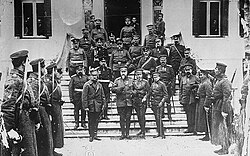
Back الأزمة البوسنية Arabic Bosniya böhranı Azerbaijani Баснійскі крызіс Byelorussian Анексия на Босна и Херцеговина Bulgarian Aneksijska kriza BS Bosenská krize Czech Bosnienkrisen Danish Bosnische Annexionskrise German Crisis bosnia Spanish بحران بوسنی Persian

| Events leading to World War I |
|---|
 |
|
The Bosnian Crisis, also known as the Annexation Crisis (German: Bosnische Annexionskrise, Turkish: Bosna Krizi; Serbo-Croatian: Aneksiona kriza, Анексиона криза) or the First Balkan Crisis, erupted on 5 October 1908[1] when Austria-Hungary announced the annexation of Bosnia and Herzegovina,[a] territories formerly within the sovereignty of the Ottoman Empire but under Austro-Hungarian administration since 1878.[9]
This unilateral action—timed to coincide with Bulgaria's declaration of independence from the Ottoman Empire on 5 October—sparked protestations from all the Great Powers and Austria-Hungary's Balkan neighbors, Serbia and Montenegro. In April 1909, the Treaty of Berlin was amended to reflect the fait accompli and bring the crisis to an end. Although the crisis ended with what appeared to be a total Austro-Hungarian diplomatic victory, it permanently damaged relations between Austria-Hungary and its neighbors, especially Serbia, Italy and Russia, and in the long term helped lay the grounds for World War I.[10] Austro-Serbian relations – harmed by the annexation's inflaming of Serbian nationalists[11] – continued to be strained to the point of declaring war on each other in 1914.[12]
- ^ Clark, Christopher (2013). The Sleepwalkers. HarperCollins. p. 85. ISBN 978-0-06-219922-5. OCLC 1002090920.
- ^ Menning, Ralph Richard (1996). The art of the possible: documents on great power diplomacy, 1814–1914. McGraw-Hill. p. 339. ISBN 9780070415744. Retrieved 4 October 2018.
- ^ Stevenson, David (1996). Armaments and the Coming of War: Europe, 1904-1914. Clarendon Press. p. 112. ISBN 9780198202080. Retrieved 4 October 2018.
- ^ Mombauer, Annika (2 December 2013). The Origins of the First World War: Controversies and Consensus. Taylor & Francis. p. 18. ISBN 9781317875833. Retrieved 4 October 2018.
- ^ Martel, Gordon (21 March 2011). A Companion to Europe, 1900 - 1945. John Wiley & Sons. p. 284. ISBN 9781444391671. Retrieved 4 October 2018.
- ^ Gardner, Hall (16 March 2016). The Failure to Prevent World War I: The Unexpected Armageddon. Routledge. p. 165. ISBN 9781317032175. Retrieved 4 October 2018.
- ^ Hinsley, Francis Harry; Hinsley (15 September 1977). British Foreign Policy Under Sir Edward Grey. Cambridge University Press. p. 178. ISBN 9780521213479. Retrieved 4 October 2018.
- ^ Siegel, Jennifer (3 November 2014). For Peace and Money: French and British Finance in the Service of Tsars and Commissars. Oxford University Press. p. 150. ISBN 9780199387830. Retrieved 4 October 2018.
- ^ Clark 2013, p. 24.
- ^ Clark 2013, p. 86.
- ^ Clark 2013, p. 33.
- ^ Richard C. Hall (2014). War in the Balkans: An Encyclopedic History from the Fall of the Ottoman Empire to the Breakup of Yugoslavia. ABC-CLIO. pp. 40–43. ISBN 9781610690317.
Cite error: There are <ref group=lower-alpha> tags or {{efn}} templates on this page, but the references will not show without a {{reflist|group=lower-alpha}} template or {{notelist}} template (see the help page).
© MMXXIII Rich X Search. We shall prevail. All rights reserved. Rich X Search